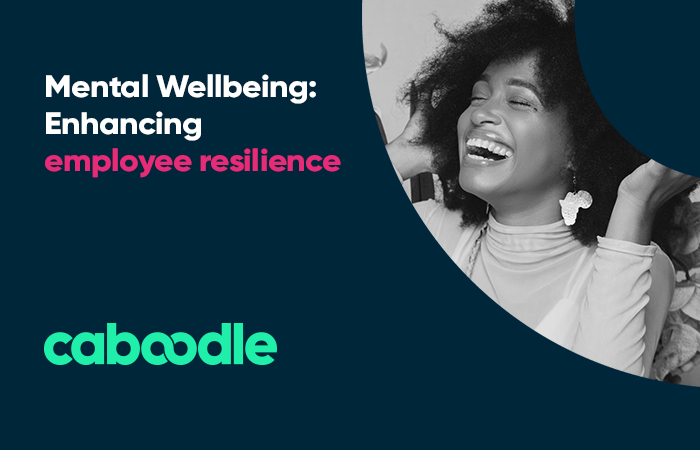 Work. Social life. Finances. Wellbeing. Chances are you’ve experienced a lot of change in one or more of these areas in recent times and this only begins to scratch the surface of the effects of the pandemic on our lives.
Work. Social life. Finances. Wellbeing. Chances are you’ve experienced a lot of change in one or more of these areas in recent times and this only begins to scratch the surface of the effects of the pandemic on our lives.
It’s this change, and more specifically how we respond to it, that is the focus of this article.
Employee resilience is an area that’s become a focus for many HR teams as a result of all this change. Supporting employee wellbeing has been a big focus and a big challenge.
So, let’s look at employee resilience, what it means and what employers can do to help employees build their resilience.
How is resilience defined?
According to the CIPD, resilience is defined in the literature as the ability of an individual to rebound or recover from adversity.
There are many definitions, most of which focus on the notion of an individual experiencing some kind of change, trauma, event or emotion and their emotional response to it.
Organisational resilience is also often discussed as businesses have had to manage and adapt to huge change in recent times.
Understanding what resilience is by definition can help businesses understand how they can support employees with it.
Social support
The level of support and advice available from managers and colleagues has been shown to be a strong indicator of resilience, particularly support from colleagues.
Research has shown that workplace interventions that encourage peers to assist colleagues through trauma led to reduced absenteeism.
Education also plays an important role in this. Managers in particular who are educated on resilience and its importance are more likely to be equipped to provide positive social support.
Positivity from leadership has also been highlighted as important in improving resilience in the workplace.
A strong support network in the workplace and guidance around how to support colleagues experiencing significant change or even trauma can help immeasurably in improving employee resilience.
Employee Assistance Programmes (EAP)
There’s lots of evidence to prove the effectiveness of the employee assistance programme in improving and supporting employee mental wellbeing.
Just ask your EAP or employee benefits provider for info on how the scheme helps employees.
The EAP is designed to be preventative but also to guide employees through a difficult situation and is designed specifically to help employees improve their problem-solving responses.
This is a core aspect of resilience, being able to understand a situation and solve the many problems it may create.
The success of the EAP often hinges on leaders, managers and effective communication.
Employees need to know that the scheme is available, what it can be used for and how to utilise it. Good social support can lend itself to this too.
Find out more about the EAP and other health and wellbeing benefits that can help improve employee resilience here.
Work-life balance
Much has been made of work-life balance and its relationship with employee health and wellbeing and it’s certainly been further under the spotlight since the start of the pandemic.
Companies who offer effective work-life balance practices have been shown to increase loyalty and commitment among their employees compared to companies who don’t.
This can help support the organisation’s overall resilience. A business undergoing significant change, therefore requiring organisational resilience, will show more resilience where employees are more committed and loyal to the business.
Going back to employee resilience, work-life balance can help in a few different ways.
Work-life balance practices can help employees form a better network of social support, which as mentioned can help employees improve their resilience.
Equally, where a company is undergoing significant change or an employee is undergoing change in their own life, work-life balance practices can help remove pressure and smoothen any transition, helping boost employee resilience.
Workshops and mental wellbeing support
Effective training workshops on mindfulness and mental wellbeing can help enhance resilience through helping employees better understand their own mind and helping develop techniques to build resilience.
Techniques like Cognitive Behavioural Therapy or even education around what types of therapy or treatment are available out there can also help build resilience.
Workshops and training must be carefully thought out and the results measured and monitored as effectively as possible.
Workshops should be provided as a way to optimise mental wellbeing or improve it further rather than being used to address bigger issues, otherwise they risk being viewed by employees as a sticking plaster over an issue that requires a different approach.
For example, issues like work-related stress brought on by an unmanageable workload, poor relationships within the business or a poor culture must be addressed head-on before mental wellbeing training workshops can be considered.
Specific training workshops or resources around the subject of managing mental wellbeing through change will support resilience development and give employees the tools to deal with change in their own lives and within the business too.
It’s a huge challenge improving employee resilience but thankfully there are lots of ways businesses can go about it. Finding the best way for your business and your team is the trick.
With the right approach, your team will not only find themselves better equipped to deal with change in their own lives but with changes in the business too. This will help to boost employee retention and help your business build a strong and happy team!